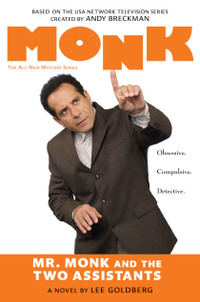My wife likes that show on HGTV where people look for a house to buy. But the show has gone dramatically downscale. The buyers on the show these days have no money to spend, no taste, and are wowed by any house that can’t be hitched to the back of a pick-up. I saw an episode where a couple went ga-ga over a house that was surrounded by a chain-link fence, was next door to a vacant lot full of garbage, and had ceilings so low, they had to walk through the whole place like Quasimodo. The host of the show called the house "lovely" and a "dream home."
I really liked NO COUNTRY FOR OLD MEN. The small parts were as brilliantly cast as the leads. Now I want to read the book…and then watch the movie again to study how the adaptation was done.
After watching a bunch of episodes of KITCHEN NIGHTMARES on BBC America, I won’t eat at a restaurant anymore unless they will let me go into the kitchen, check it for cleanliness, and scream obscenities at the chef. It seems like the only way to guarantee a safe and tasty meal.
I watched the original 3:10 TO YUMA, which was a great movie, took a break for a couple of hours, and then watched the remake. Everything about the remake was bigger, though not necessarily better. In the original, the stagecoach driver has a rifle…in the remake, it’s a Gatling gun. In the original, the hero goes up against six or seven guys in the finale…in the remake, it’s more like 50. I’m surprised they didn’t re-title the movie 6:20 TO YUMA.
I haven’t watched ER in three or four years. I tuned in this week for the much-hyped return of Gloria Reuben and because a friend of mine was guest-starring, too. My friend was great…but when did ER become TRAPPER JOHN MD?
The WGA is on strike. Jay Leno is a WGA member. He wrote for his show. It’s open-and-shut. I don’t understand the controversy or see any gray area here. Yes, he’s a nice guy and paid the salaries of his staff while the show was off-the-air…but now he is scabbing and the Guild is right to go after him for it. He broke the rules. He should be treated like any other writer who writes for a struck company during the walk-out.
I finally got around to watching BORAT. It was the funniest movie I have seen in years. I think my favorite bit was the dinner party. The deleted scenes were hilarious, too, especially the one at the dog pound.
I got an unsolicited email from a complete stranger who has written a novel and wanted me to ghostwrite a re-write because, and I quote, "I am not a writer." I wrote back and said I wasn’t a ghostwriter and that I wasn’t interested in rewriting his book. He wrote back and asked how someone who isn’t a writer can write a book if writers won’t help him? I suggested that he take a writing class and become a writer himself. He wrote back that he doesn’t have the time because he has a real job.



